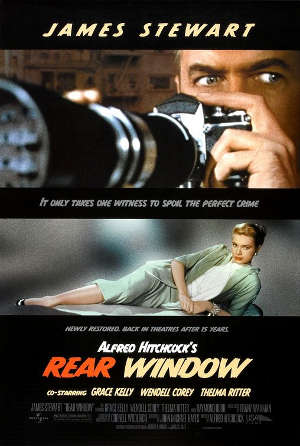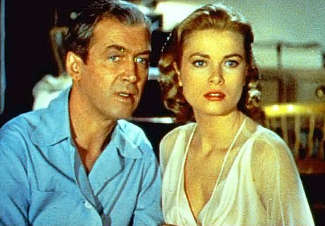- Title: Rear Window
- IMDB: link

“Well, if possible, both.”
With the recent release of Disturbia I thought this would be a good time to introduce a new feature and take a look back at the film which it pays homage to. Alfred Hitchcock’s Rear Window is considered one of the director’s finest films by both critics (it earned a 100% Fresh rating from Rotten Tomatoes and ranked #42 on AFI’s 100 Greatest American Movies of All Time) and fans (at the time of this review it ranks #16 on IMDB’s Top 250 Films of All Time).
 Alfred Hitchcock, ah, there was a man who knew how to tell a tale. The joy in Rear Window is the simplicity. One man looking into the windows of his neighbors discovers a little about them, and a little about himself, and uncovers what he believes is evidence of cold-blooded murder. It’s a film of slow revelations, of constant building tension, of troubled relationships, and of learning the truth about yourself as well as your neighbors. If you enjoy suspense then you could search long and hard trying to find a flick better than this one.
Alfred Hitchcock, ah, there was a man who knew how to tell a tale. The joy in Rear Window is the simplicity. One man looking into the windows of his neighbors discovers a little about them, and a little about himself, and uncovers what he believes is evidence of cold-blooded murder. It’s a film of slow revelations, of constant building tension, of troubled relationships, and of learning the truth about yourself as well as your neighbors. If you enjoy suspense then you could search long and hard trying to find a flick better than this one.
Stuck at home with a broken leg, photojournalist L.B. Jefferies (Jimmy Stewart) begins to examine the world around him finding numerous worlds in the apartments across the courtyard. Over the past six weeks these strangers have become his form of entertainment and his only way to experience the outside world.
Through his window Jefferies spies on a beautiful dancer (Georgine Darcy), a songwriter (Ross Bagdassarian), a pair of newlyweds (Rand Harper, Havis Davenport), a sculptor (Jesslyn Fax), a couple with a precocious dog (Sara Berner, Frank Cady), a lonely single woman (Judith Evelyn), and a henpecked salesman (Raymond Burr) and his wife (Irene Winston). Each character has their own story and tells us quite a bit about Jefferies and his views of the world and love.
Hitchcock could easily have used the extras merely as window dressing, but even as Jefferies obsesses with the salesman, his eyes always take time into looking into each of the separate worlds (in an amazing set built on a studio sound stage).
When the salesman, who we later learn is named Thornwall, starts behaving strangely and his bed-ridden wife is suddenly missing, Jefferies begins to suspect foul play, and snares his friends, including his girlfriend Lisa (Grace Kelly), a police detective (Wendell Corey), and his nurse (Thelma Ritter) into his web of suspicions. More and more clues appear, but are they real or the stuff of paranoia brought on by being cooped up in an apartment for a month-and-a-half?
 The film’s set-up is perfect. We see Jefferies, we see what he sees, and we see his reaction to it. He’s trapped, as we are with him, unable to act and forced to watch events unfold. Here Hitchcock gives us the double-edged sword of voyeurism. Sure, you can look anonymously into countless other worlds, but you remain apart from them, unable to touch or directly effect them.
The film’s set-up is perfect. We see Jefferies, we see what he sees, and we see his reaction to it. He’s trapped, as we are with him, unable to act and forced to watch events unfold. Here Hitchcock gives us the double-edged sword of voyeurism. Sure, you can look anonymously into countless other worlds, but you remain apart from them, unable to touch or directly effect them.
The further the film goes we begin to believe he may be right about Thornwall, but when his facts begin to be disproved one-by-one we wonder what the truth really is. And Hitchcock makes us wait, teasing us with clues and revealing the truth only at the last possible moment in a terrific climax (and perhaps even a better epilogue). Oh, how many current Hollywood writers and directors could learn a lesson here!!
Jimmy Stewart is perfectly cast as the man we want to believe with his own flaws and fears that may be coloring what he sees. And Grace Kelly, what can I say? If there’s ever been a more beautiful woman to grace movie screens (pun intended) I dare you to find her. Smart, sassy, playful, intelligent, and able to convey complex emotions in the slightest action or look. If the film has any flaw at all it’s that any man would think twice if such a woman wanted to marry him. On the DVD the film is loving restored into full color and clarity that will astound you. Rear Window is a perfect addition to any DVD library.

Comments are closed.